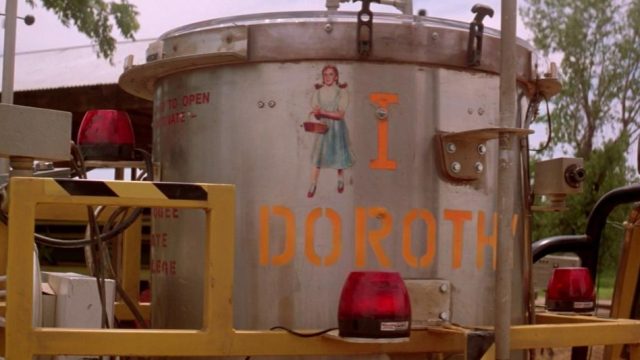After my adventure revisiting Dante’s Peak, I decided to go back to Twister. Or, more accurately, to finally watch Twister properly: I’m pretty sure I only ever saw random bits of it on TV.
I wish I had the Dante’s Peak nostalgia filter for this. I wanted to like Twister, which has an astonishing cast lineup–Bill Paxton! Helen Hunt! Cary Elwes! Alan Ruck! Philip Seymour Hoffman! Jeremy Davies!–and a disaster movie setup near and dear to my Midwestern heart. But I regret to say that I wanted almost all of these assholes to die by tornado.
The movie valorizes its storm-chasing scientists to a hilarious extent, and that winds up being its biggest problem. Tornadoes in Twister are as ubiquitous as serial killers on Criminal Minds. If you miss deploying your data-collecting gadget into one, don’t worry, another one will be along in a minute.
Now, tornadoes aren’t all that uncommon in real life, either, and you can justify their whack-a-mole presence in Twister by saying, correctly, that it’s the characters’ job to go chasing after them. Of course they’re going to run into a statistics-skewing number, and this is explicitly a statistics-skewing series of events. But even if it’s not a problem for logic, it’s a problem for the emotional affect of the movie, because I simply can’t keep worrying about the same danger I’ve already seen the characters avoid multiple times. Then it’s not a disaster movie, because these aren’t disasters, they’re just work–which makes this a procedural, but one without the genre’s usual strengths.
The characters avoid tornadoes so easily, in fact, that it makes it seem like tornadoes, despite their destructive grandeur–and I’ll give Twister this, the effects look good even now–are more pesky inconveniences than actual threats. It kneecaps the movie’s stakes: if Jo (Helen Hunt) and Bill (Bill Paxton) aren’t able to collect the data they need to increase tornado warning time, is it really that big of a deal?
Jo thinks it is, because the film’s prologue helpfully supplies her motivation by having a tornado kill her father. But I watched that scene, Jo! Your dad didn’t die because there wasn’t enough time to get to shelter! He stood around watching the news about the storm, then finally snapped into gear and got the family down to the storm cellar … and then died because he was trying to hold the door closed to save his family. Since they’re perfectly fine even after the storm sucks him out and leaves the cellar wide open, his sacrifice seems kind of pointless, and it’s hard not to think that Jo’s backstory should maybe just motivate her to give people more information about how to shelter from tornadoes.
But Twister doesn’t want to think about any of this. There are good scientists and bad scientists, and the bad scientists are smarmy idea stealers who take corporate money, drive around in black vans, and give interviews to the press. (Something Jo and Bill might want to consider doing, since they’re struggling for funds.) They don’t have the amorphous tornado instincts. In short, they’re not our good guys, who come with a crew of loud, jokey characters! Boy, look at them rocking out in their vans and alarming strangers and being so colorful!
Paxton and Hunt don’t get to join in on all the “fun” characterization, though. They’re playing exes who–contentiously–haven’t yet signed the divorce papers, even though Bill is on the verge of getting remarried. Their obvious reconciliation looms, but they’re actually much better at the testy awkwardness than they are at the romantic chemistry. They both wind up feeling slightly miscast–Paxton is one of my all-time favorites, but he had the heart of a character actor, and this role needs a movie star, not an actual performance–but they gamely try; they do manage some realistic emotional texture, especially when there’s friction involved. Paxton is especially good with Jami Gertz’s Melissa, his new fiancée, who is confused and scared but trying hard to keep up. The writing around Melissa is surprisingly sympathetic, too, and all in all, the love triangle here is actually written with nuance and care. But it’s Melissa’s loss, not Bill and Jo’s reunion, that hits hardest.
Cary Elwes emerges as the one who really understood the assignment. As slimy scientific plagiarist Jonas, he’s marvelously and enthusiastically hammy: exactly the kind of broad strokes character you need for a disaster movie. He could be a recurring villain in a ’90s cartoon series, and I mean that in the best possible way. He’s not my favorite actor in this, but he turns in my favorite performance–lively but without a sense of trying. If you want to watch Twister–and enough people like it that you very well might, despite my ambivalence–Elwes and the tornadoes themselves are the parts I would particularly recommend to your attention.
Twister is streaming on Max.

